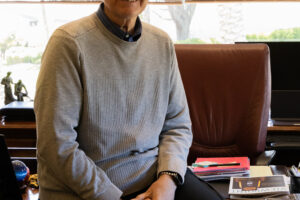(faculty advisor to The Point during 1975-76, who backed the Point staff and supported the Blunt writers censored by the Administration)
By Dean Nelson, Ph.D. Director, Journalism Program
You hear him coming down the hall before you see him. It’s usually a Frank Sinatra song (sometimes with words, sometimes just scat singing). Or it’s just as likely a song from George Beverly Shea. And it’s always punctuated with his throat clearing, like he provides his own percussion to his melodies. He sings because he’s happy. Not in an existential way, though. In that regard he’s miserable. But walking down the hallway, engaging colleagues in banter, extolling students? Yeah, he’s happy.
And we’re happy to hear him. Always.
He came to this university after rebuffing then-president Shelburne Brown twice. The third time Brown called, McKinney indulged him, just to hear him out. But he didn’t plan on taking the job at Pasadena College in 1970. As far as McKinney was concerned, there was no way a college could be both Christian AND have intellectual integrity. He had never observed such a place. Then he met Brown. A year or so later Brown added academic giants like Noel Riley Fitch, Bill Hobbs, David Strawn, Fordyce Bennett, Dale Shellhamer. A theology professor named Frank Carver took a class from McKinney. For a grade. Faculty members Eugene Mallory and Ken Frye embraced the young McKinney, fresh out of his Ph.D. program at USC, and became his mentors.
When Pasadena College moved to its present location in Point Loma, McKinney commuted from his home in Anaheim. He stayed in San Diego Monday through Wednesday, went home on Thursday, came back on Friday. For five years. The school began to grow and grow and grow.
McKinney’s discipline is literature, and he is drawn to the same writers today as he was in school. His dissertation was on Gotthold Lessing, one of the early writers of the German Enlightenment. The focus was on Lessing’s development of the modern theory of tragedy as a dramatic genre. That figures.
Then Herr McKinney branched out to include Russian novelists. He published an academic paper on Dostoevsky as part of a National Endowment for the Humanities grant, and the attachment to the author of Brothers K took hold. Then was awarded a Fulbright to study further in Europe.
The paradise of Point Loma took a turn for the worse for McKinney, who, under a new president, was denied tenure and a promotion, and was advised by his department chair to look for work elsewhere. He attended law school part-time at the University of San Diego morning and night, without telling anyone, and graduated as one of its top students. He published a remarkable paper defending the rights of immigrants. This was in the 1970s. Then he passed the California Bar exam first try. While teaching full-time and raising a family. He invented multitasking.
A new president arrived at Point Loma and asked McKinney to stay.
While teaching German and Literature, he practiced law at the appellate level, defending those who could not defend themselves, mostly Black and Brown people convicted of murder. He worked with clients who had been mistreated by the massive justice machine, and those who had mistreated others — living out both the German tragedy and Russian search for redemption with every case. He argued on their behalf in front of the California Supreme Court. He won some cases, but not many.
Thus his perpetual existential angst. Maybe that’s what he’s trying to clear from his throat. Dostoevsky writes about redemption, about embracing the other, about reconciliation with God and the human family – especially after one has broken that bond. McKinney has always embraced that embrace. That’s what kept getting him labeled as a liberal. One conservative colleague explained “the problem” of his liberalness to him this way. “The difference between conservatives like me and liberals like you is that we conservatives know the truth, and you liberals are still searching for it.” If that’s the definition, then count many professors, students, Christians, as liberals.
He argued passionately and eloquently to support and retain the study of literature at Point Loma Nazarene University (PLNU) because of the role literature plays in the total development of students. As the school moved to a more professional and science-based curriculum, away from the humanities, his throat clearing only increased.
In his literature classes, he would continually ask his students why characters in the stories did what they did. What motivated them? He kept saying, “We would need a trained psychologist to explain this character’s behavior.” Out of that came one of the most profound courses he taught — co-teaching it with former student and now psychology faculty member Michael Leffel. The course was called The Human Challenge.
Students were effusive in their thanks for permission to question, to search, to accept complexity, for not telling them what to think. Most of them, anyway. He was a human suspension bridge, giving students a means to cross to a side they didn’t know was even there.
When he sent his message of retirement to the president and the provost in 2020, as he hit “Send,” he broke down. The weight of it, the meaning of the last 50 years, descended.
For his last semester at PLNU, while we were all online and most faculty were teaching from their homes, he still came to the classroom each day and taught from his podium to a screen of faces. For his last German class, he played the music of a children’s choir singing at Ground Zero of the September 11 attacks “Let There Be Peace On Earth.”
For his last literature class, November 18, 2020, a half-century after beginning his PLNU career, he taught the short story, Matryona’s Home, by Alexander Solzhenitsyn. A Russian, of course. The story is about a character whose life is good and credible, despite adversity. She finds joy in work well done. Her suffering has not beaten her down. She harms no one. The last lines of the story are:
“We all lived beside her and yet never understood that she was that righteous one, without whom, the saying goes, a village cannot stand.
“Nor any city.
“Nor our entire (earth) land.”
Then, an emotional Mike McKinney read the prayer of St. Francis Assisi, waved to the students on the screen, and walked out of the frame.








